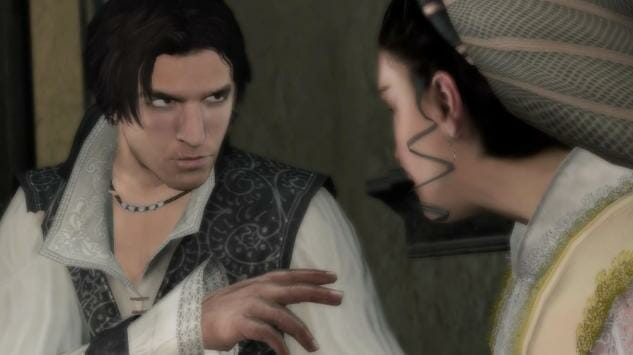A Good Story Starts With Good Characters

I wasn’t prepared for how much I loved Ezio Auditore in Assassin’s Creed II. He’s a playboy, a scamp who likes mischief and girls and razzing his friends. His necklace instantly reminded me of the seashell necklaces the bros in The O.C. wore, and I was smitten. Ezio was a fully realized character in a fully realized world. But it’s more than just that: the world of Assassin’s Creed II and the events of the game hinge entirely upon Ezio being the type of character who can support this world and make it feel like a place I am truly experiencing. And he does.
The world of Assassin’s Creed II is vibrant, teeming with life that feels real and events that are based on real people. But Ezio is the spark that makes this world work. Without Ezio’s earnest smile and unrelenting loyalty to his family, the movements of the world wouldn’t fully shine. It’s Ezio’s drive, his words, his “what are you thinking, Da Vinci, you’re crazy” looks that make the story of his revenge so powerful. It’s easy to care for Ezio because he’s written to be a real character. He isn’t a silent protagonist and he isn’t a rote tank who punches first and asks questions later. When the game starts off, he’s young. He’s crawling into girl’s bedrooms through their windows and getting into fights with other dudes. He’s basically every teenage boy I grew up with (and I have five brothers, so…). The world of Assassin’s Creed II matters to us because Ezio matters to us—and makes it believable.
As a professional editor working heavily in fiction and as a narrative design mentor in games, there’s one thing that I always come back to when people ask about what makes a good story: a strong character. Create somebody your players (or readers or viewers) are going to latch onto, relate to, or care about (either to love or to hate). Make it meaningful. And more often than not, characters are the best vehicles to impart the greater meaning and themes present within a beautifully constructed universe.
Take Loader Bot from Tales from the Borderlands, for example. The endearing Loader Bot basically fulfills the function of a puppy who can walk, talk and shoot things. Loader Bot also reflects the necessities of the world he inhabits. Pandora is predicated on danger and murder, but also on protection and friendship. When players are first introduced to Loader Bot, it’s initially through a moment of “oh my god we’re going to die.” But throughout the fight, Loader Bot shifts from just being a weapon to becoming a friend, reflecting the dynamics of Borderlands: the people who help you survive are also your best friends, and there is no surviving in this world without friends. So when Rhys hurts Loader Bot’s feelings, we feel it. And not just because of Loader Bot’s aforementioned puppyness, but because betraying Loader Bot is a deep cut that signifies a disruption of what makes Pandora habitable and safe: friends who have your back, especially when a lot of people are trying to kill you.
It’s the same with Mass Effect. The first Mass Effect is so wonderful, in large part due to the banter between your squadmates. Wrex and Tali take jabs at each other in the elevator loading screens, giving life to the conflicts we are otherwise just told exist in the universe. “Some people back there didn’t like you, Tali,” Wrex says. “Many think less of quarians for travelling in the flotilla, and for creating the geth. They see us as scavengers, little better than thieves,” Tali responds. “Perspective is a beautiful thing. Wait until their homeworld gets wiped out,” Wrex says, to end the conversation. Wrex’s anger and Tali’s hope blend together to show the real rifts that play out because of the history of this universe. It begins as a playful jab, Wrex goading Tali like an older brother, and turns into a moment of solidarity and understanding between two very different characters. Wrex understands Tali’s perspective—the Krogan having been subjected to the genophage—even if their reactions to the way the world reacts to them is different. It’s the little things, but they give life to what otherwise runs the risk of feeling like a history textbook at times.
Without strongly written characters, an amazingly detailed universe or epic plot will fall flat. Characters bring great worlds to life. The internal political and sociological machinations of a well-designed society, world or universe mean nothing if the characters can’t support it to make it feel real.